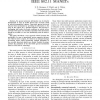Free Online Productivity Tools
i2Speak
i2Symbol
i2OCR
iTex2Img
iWeb2Print
iWeb2Shot
i2Type
iPdf2Split
iPdf2Merge
i2Bopomofo
i2Arabic
i2Style
i2Image
i2PDF
iLatex2Rtf
Sci2ools
VTC
2007
IEEE
2007
IEEE
Time-Stable Geocast in Intermittently Connected IEEE 802.11 MANETs
— By geocast protocols, information can be directly disseminated to users of mobile devices who currently reside in selected geographical regions. Time-stable geocast protocols enhance these mechanisms by providing the information to the users in the regions for a specified duration. This becomes a challenging task under the harsh conditions in mobile ad-hoc networks with sparse user densities, especially if the information should be provided to a new user immediately when he enters a region. This paper introduces a new approach which increases the probability of a user to immediately receive respective information when he enters a region. It is based on an enlarged message forwarding region, being dynamically adapted depending on the currently perceived spatial user density. Besides, the paper presents the realization of the time-stable geocast mechanisms based on IEEE 802.11 technology.
| Added | 04 Jun 2010 |
| Updated | 04 Jun 2010 |
| Type | Conference |
| Year | 2007 |
| Where | VTC |
| Authors | Sven D. Hermann, C. Michl, Adam Wolisz |
Comments (0)

